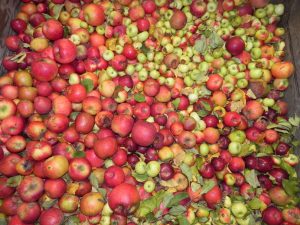Since it ‘tis the season to revel in feasting and magical thinking (like dreams of stress-free family gatherings), let’s take a look at the folklore and facts surrounding a few ingredients we grow and use in our holiday meals.
Sage: an ancient cure-all? The beautiful, fragrant herb we use in dressings has been revered in spiritual practice and touted as a cure for all manner of ailments since ancient times. Some Native American tribes use sage to this day for spiritual purification and healing, and ancient Romans used the “holy herb” in religious rituals.
There has been very little conclusive research about sage’s medicinal uses, but it’s still a beloved culinary herb.
Garlic: keeping evil spirits at bay. For thousands of years in cultures from China to the Middle East and Europe, garlic was used to both increase physical strength and ward off vampires, witches, and other dark forces. In Egypt, when archeologists opened King Tut’s tomb, they found garlic bulbs strewn about the rooms.
So, is there any merit to garlic’s medicinal or magical uses? Yes and no. Garlic does have natural antibiotic properties. And while there have been scientific studies linking garlic intake to cardiovascular health and lowering the risk of some cancers, there’s no evidence that a string of bulbs will keep the witches and werewolves away.
Apple: all-knowing, all-healing? Between symbolizing knowledge in the Garden of Good and Evil, and carrying the responsibility of “An apple a day keeps the doctor away,” the humble apple has seen its share of wide-ranging folklore. Merlin, the legendary magician, was said to carry a silver bough from an apple tree, which allowed him to cross into the netherworld and return to the land of the living.
But the health benefits of apples are no myths. Webmd states that “Some studies show that plant chemicals and the fiber in an apple peel protect against blood vessel and heart damage. They also can help lower your cholesterol, and they might protect your cells’ DNA from something called oxidative damage, which is one of the things that can lead to cancer.”
Orange and Clove: the power of scent. The orange pomander descends from medieval “pomanders” (from pomme d’ambre or “amber apple”). They were carried or worn as an herbal amulet to ward off diseases, including the plague, which was believed to be spread by bad smells.
Truth is, the highly volatile essential oils in clove and orange oil are powerful natural antimicrobials and antiseptics. While they don’t stop the plague, the strong, concentrated aromas are genuinely effective at masking unpleasant odors and repelling.
Ginger: Magical medicine? Ginger was highly valued along ancient trade routes, believed to possess powerful medicinal and magical properties, including the ability to ward off evil spirits and attract good fortune. King Henry VIII was rumored to eat a ginger preparation to protect himself from the plague.
In fact, ginger—and other holiday spices like cinnamon, clove and nutmeg—are now known to be potent antioxidants and have been historically used as digestive aids to comfort the stomach after a heavy feast.
Speaking of holiday feasting, may your recipes turn out to be magical and (ahem) fairly healthy.
Rachel Oppedahl is a UCCE Tuolumne County Master Gardener of Tuolumne County.

